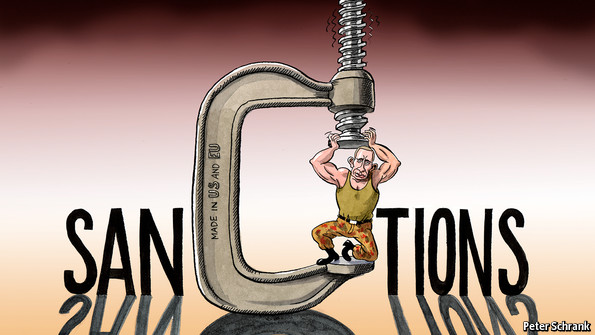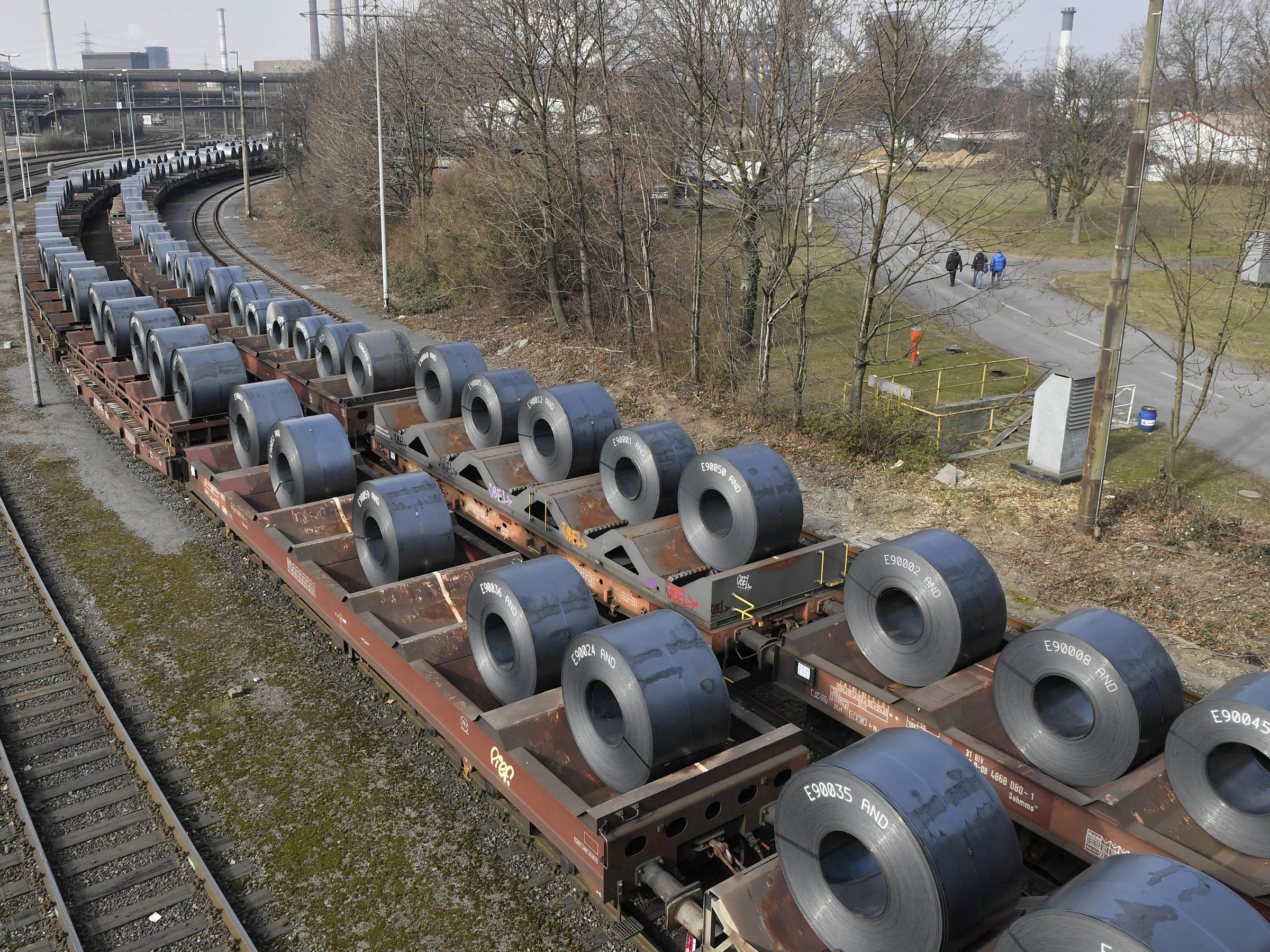
Old New Sanctions
A New Twist in the Sanctions Policy
U.S. Ambassador to the U.N. Nikki Haley stated to CBS News that new sanctions are connected to Russia's support of Bashar Assad’s regime in Syria. The West blames Assad for chemical attacks against civilians in Syria. She also stated that the sanctions are related to the companies connected to the production or use of chemical weapons; however, she did not give any precise comments about it.
A few weeks ago, the U.S. Department of the Treasury targeted big business in Russia. Twenty four Russian businessmen and officials, as well as 14 Russian companies—in particular, RusAl, En +, GAZ, Basic Element and EuroSibEnergo*—were slapped with the U.S. sanctions. On the sanctions announcement day, the shares of RusAl and En + Group fell by 12 percent and 20 percent respectively. Some media even compared it to "Black Monday,"** when the Russian stock exchanges reacted to the new restrictions with a sharp drop.
Many other Russian businessmen and companies were also affected by this. According to Forbes, Russian billionaires lost approximately $12 billion in one day. The sanctions had an effect on other Russian oligarchs, who massively began to get rid of their foreign assets; therefore, this strategy will most likely be used in the sanctions policy again.
What Else Can the U.S. Do?
The sanctions list will be growing based on the members in the Kremlin report. The expansions of the sanctions list can happen in several stages, taking into account the fact that there are a lot of big businessmen there. The media have repeatedly reported that Abramovich, Usmanov and other major Russian oligarchs may be subject to sanctions.***
Also, a sanctions course against Russian corporations that export goods to the United States will be continued. The main export industries, according to statistics, are the following: metallurgical, reactive, hydraulic and pneumatic engines and power plants, and carbon-based electrical products.
The RusAl example, whose main market was in the United States, showed the effectiveness of such measures. However, anti-Russian policies can also be implemented through indirect measures.
Related Issues
Russia might be harmed by a so-called trade war between the United States and China. Oversea-Chinese Banking Corp hypothesizes that raw material prices will continue to decline, and oil prices will drop by 30 percent, or up to $50 a barrel. According to the OCBC Bank economist Barnabas Gan, the main metals will be down 15 percent; platinum group metals and silver will be down 10 percent. The trade war between the United States and China will affect the economy of our country, due to the fact that most often Russia exports raw materials.
International tension tied to the Syrian crises also influenced the Russian economy. The exchange rate of the national currency fell not only due to sanctions but also due to the threats to attack Syria made by the United States and its allies. Thus, Western countries continue to keep tension on the international arena so, if necessary, they can try to pressure Russia with the help of indirect tools.
How Will Russia Respond?
The State Duma [the lower house of the Federal Assembly of Russia –Ed.] is already working out options for responding to U.S. sanctions. The website published the bill, which lists counter-sanction measures. It was authored by 327 out of 450 Duma members, which underlines its universal support. The bill's main response will include following:
— A prohibition on the import of agricultural products: The so-called food embargo has been in effect since 2014, but the list of food products that will be banned for import can be significantly expanded.
— A ban on import of alcohol and tobacco products
— Personal sanctions against individual citizens: Some citizens of the United States and other countries that support sanctions policy against Russia may be prohibited from entering the territory of the Russian Federation.
— Termination of cooperation with organizations that are directly or indirectly connected with the United States or are under their jurisdiction: The ban will apply to the following branches: aircraft construction, the nuclear industry and the missile industry.
— A ban on the hardware and software produced in the United States (for government-owned corporations)
— A ban on the purchase of consulting, auditing and legal services from U.S. companies to ensure the state and municipal needs of the Russian Federation
— U.S. companies or related legal entities will not be able to participate in the privatization of state or municipal property.
— A ban on the participation of the U.S. companies in the sale of federal property on behalf of the Russian Federation
— An ending of the exclusive right to trademarks in respect to goods, the list of which will be adopted by the Government of the Russian Federation: In other words, American goods can be reproduced without any permission in Russia.
— Raising fees for air travel for the U.S. companies
— A ban on the export of products and equipment from rare earth metals in the Russian Federation to individuals and legal entities of the United States and other countries
— Prohibition of work for U.S. and other states' citizens
— A ban on the import of drugs manufactured in the U.S. or other countries
— A ban on the import of any other goods produced in the U.S. or other countries: A list of such goods can be developed by the government.
Consideration of the bill is scheduled for May 15.
Obviously, some of the above measures will hit citizens of the Russian Federation the hardest. For example, many vital medications are only manufactured in the United States. If Russian authorities do not ensure the rights of trademarks, foreign companies will stop supplying products to our markets, especially machinery, so that Russian producers do not copy it. The last measure suggests that Russia can ban the import of any product.
Taking into account that Washington prepares a new sanction package for every response from Moscow, the confrontation is closing in on itself, and continues to spiral, with each new round provoking the next one.
Mirroring Measures
Russia continues to take a tough position toward any anti-Russian measures. Officials have repeatedly stated that each sanction will have a mirror response, so the new U.S. sanctions package will not remain without countermeasures. However, the participants of this sanctioning confrontation are running out of resources and tools of pressure.
*Translator's Note RusAl-United Company RUSAL is the world's second-largest aluminum company by primary production output. The company is incorporated in Jersey, where it has its financial center, but its headquarters are in Moscow, Russian Federation. En+ Group is a
Russian energy-related company controlled by Oleg Deripaska. GAZ Group is a Russian automotive conglomerate headquartered in Nizhny Novgorod. Basic Element is one of the largest diversified industrial groups in Russia, founded in 1997 and owned by Oleg Deripaska. EuroSibEnergo is Russia’s largest independent power company (in terms of installed electricity capacity of power generation plants) and ranks as one of the largest hydropower generation companies in the world.
**Translator's Note: "Black Monday" in this context refers to the 1998 Russian financial crisis. It resulted in the Russian government and the Russian Central Bank devaluing the ruble and defaulting on its debt.
***Translator's Note: Roman Abramovich is a Russian billionaire businessman, investor, and politician. Alisher Usmanov is an Uzbek-born Russian business magnate.

